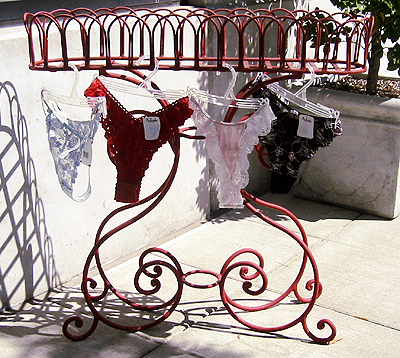11.6.2003 | Safety in double standards

Undies in the Pearl District, Portland, this summer.
It's been a physically and emotionally draining day. I woke up early to run five before an interview for a job I really want, and there are few jobs I have ever really wanted. Even though Andrew brought me some of his best-brewed coffee for wake up, and even though the running went OK, the interview really took it out of me. I left there with a low-level doubt that they would hire me. This despite the fact that I'm totally overqualified and the position pays half or even less than half what I charge for editing work. I can't figure out what it was that created the doubt—one question in particular about my work history? Maybe it was a certain coldness I felt from them. Maybe I am projecting my insecurities onto them. There is no way to know right now; there is only waiting, and I will be waiting for at least three weeks for an answer, they predicted.
So I am releasing the tension with soothing things, like chocolate cake and coke and dinner out and letting myself write easily to music that flows out from under the desk instead of working on stuff for one of the many jobs I have.
Today Ridgeway pled guilty to killing 48 women. Speaking of self-soothing, Ridgeway's extreme sociopathy aside, he said he killed to release the tension from his daily life. From time to time today, I've thought about all the options people have for releasing tension. For example, I contemplate the comfort in this cup of green tea between me and the keyboard and how, as I drink it, I feel anxiety shifting into relaxation. And I think about the quicker, more infantile, things we do to accelerate our release from emotions we can't bear. I do that, too; I'm glad to have developed relatively benign coping habits, though. Most of the time, I check out, slip into sloth. Or, if I'm on top of it (lucky) maybe I'll face the stuff head-on and just cry and scream in agony to let it go. But for a lot of people, release from unbearable emotions comes in violence. For so many women, it's parasuicidal behavior. For many men, and this one man in the extreme, it's homicidal behavior. Predictable, isn't? Inward-directed harm vs. outward-directed harm? Women are so much more safe; we usually only mutilate ourselves.
What is it about our culture that makes (usually white) men into such meticulous predators? Have we determined that yet, or are we still protecting that toxic aspect of the patriarchy? And how will Seattle bear another serial killer mascot? Bundy, now Ridgeway. Apparently Bundy was jealous of the attention paid to the Green River Killer. To grab some of the attention for himself, he offered investigators his insights into the killer's motives. Ensconced in narcissism, though, he could only tell investigators about things he had done. Turns out Bundy was right to be jealous: Ridgeway was a far more calculating and committed killer than Bundy, with only a fraction of the education Bundy had.
Two things I have been thinking about.
First, cognitive dissonance. You know, most of the time when I hear people mention cognitive dissonance, it carries a slightly negative connotation. But cognitive dissonance actually is a potential point of awakening—the point at which you become aware of your own double standard in a particular situation and the point from which psychological transformation can occur. When your motives are hidden from yourself, you merely perpetuate a double standard, observable in behavior and unconscious projections, of course. You look more foolish when you are not in conflict—when you blindly hold people to standards you yourself can never meet or that you blithely violate, for example. But from the conflict, from the anxiety that you have to endure in it, it's possible to reconcile the double standard. In the forensics program where I work (one of too many positions), the presence or absence of cognitive dissonance is an important piece of evidence. An observation of cognitive dissonance is cause for optimism. But, you know, most people can't tolerate leaving the safety of denial to imagine unknown ways of being.
One of my goals is to try to be as honest with myself as possible. That is not easy and requires a diligence I don't always have. Sometimes as much as a year or more will pass before it comes back to me and I renew the resolution. This is one of the things William Gibson talked about in No Maps for These Territories, one of the easy points of agreement and false identification, as I mentioned. He added, though, that such honesty with the self is just not possible for some people. I believe that is true; it's a sad truth, isn't it?
Second, Andrew has this funny little game he plays where he imagines how people he knows would treat themselves if they were ever to meet themselves. We were talking about this the other day and I asked him about his guess of how I would be with myself, if I ever met me. I think he said he thought that I would get along quite well with me. After I thought about it for a moment, I realized that if I ever met myself, I would probably be jealous of me. That's an interesting dialectic, don't you think? It at once illuminates how deeply inadequate I feel while also revealing a fairly high degree of self-acceptance. Since that conversation, I've felt a lot better about who I am. I feel like I have a window into how other people see me: I can see that I've led, am leading an interesting life, and that I do an amazing variety of things, holy shit, let me tell you.